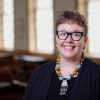This article is more than 5 years old.
It doesn’t quite seem possible that I’ve been home from ALA for a week now, just as it didn’t seem possible that my time at ALA passed so quickly (nor does it seem possible that tomorrow is July 4th, but that’s a bit beside the point of this post!). This was only my second time at ALA Annual, so I’m definitely still learning how to maximize my schedule. For most program/meeting slots, I had two, if not three, events I wanted to get to, and I missed a lot of wonderful-sounding programs due to meetings. I know this is the bane of most people’s ALA experience, but it’s still frustrating!
As it shook out, my non-meeting ALA experience centered around the theme of fair use in libraries. With the recent GSU e-reserves decision, and the late January, post-Midwinter release of ARL’s Code of Best Practices in Fair Use in Academic and Research Libraries, there were many panels and discussion groups on this theme. I attended two panels on fair use Saturday morning and early afternoon, the latter of which drew a standing room only crowd. The afternoon panel discussed three fair use cases involving libraries: the GSU case, the UCLA film streaming lawsuit, and the HathiTrust lawsuit. It was fascinating to hear two non-librarian lawyers’ perspectives on the UCLA and HathiTrust cases. There was a healthy Q&A that delved into libraries’ responsibilities–and limitations–in assisting patrons using our orphan work materials for scholarship and documentary film production. I also heard the clearest set of questions to use in evaluating if a proposed use is fair:
1. Are you using the material to illustrate a specific point?
2. Are you using only an amount sufficient to illustrate the point?
3. Is is clear to your audience what point you are making?
If you can answer yes to all three, then your proposed use is likely going to be fair. Definitely need to share these with the doc film folks! My final fair use-themed event was the late Sunday afternoon ACRL Scholarly Communication Discussion Group, which also focused on the GSU case decision and its impact upon libraries. However, this time I was at the front of the room as a panelist, providing the non-lawyer librarian perspective. I really like the format of the discussion group, as the panelists give intentionally brief comments before opening up for questions and discussion in the room. We had a GSU librarian in attendance who gamely provided information and perspective that enriched our conversation. Thanks again to Lynn and Carolyn for coming!
Breaking with the fair use theme, the ACRL/SPARC Forum late Saturday afternoon highlighted campus open access funds. As you know, Wake Forest has had such a fund for Reynolda campus faculty since 2008. Between experiences in administering our fund in the past year, and information I learned at the Forum, I have some ideas brewing on how we might need to adjust our fund criteria for the future to best serve both our faculty and the larger open access movement. More is likely to come as my ideas ferment.
I had three major meetings while in Anaheim: a planning meeting (that spilled into dinner) for the ACRL Scholarly Communication Road Show presenters on Friday afternoon/evening; the ACRL Scholarly Communications Committee meeting Sunday morning; and, the ACRL 2013 Panel Session Committee meeting Monday morning. All were productive, and I feel good about my participation in each group.
The one thing I felt I did a great job of managing at ALA was maximizing mealtimes to network and catch up with colleagues. Other than breakfasts, I had plans with others for each meal, splitting those between colleagues working in scholarly communication/copyright, friends made through Emerging Leaders, and catching up with ZSR folks. Generating new ideas and learning new practices are beneficial, but so too are maintaining connections with colleagues, and I returned from Anaheim succeeding in all!

3 Comments on ‘Molly at ALA Anaheim’
It seems to me you mastered how to maximize your time at ALA. I’d love to hear more detail at our next meeting 🙂
Congratulations on a successful ALA and for your representation of ZSR so well. We need and benefit from your work in copyright/fair use and scholarly communication.
I love those three questions on fair use. So much more useful than other ways of thinking about it.